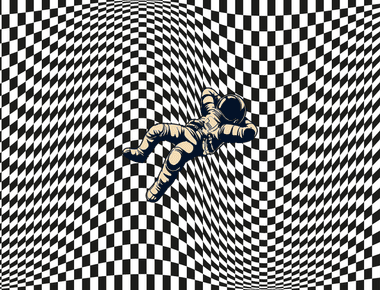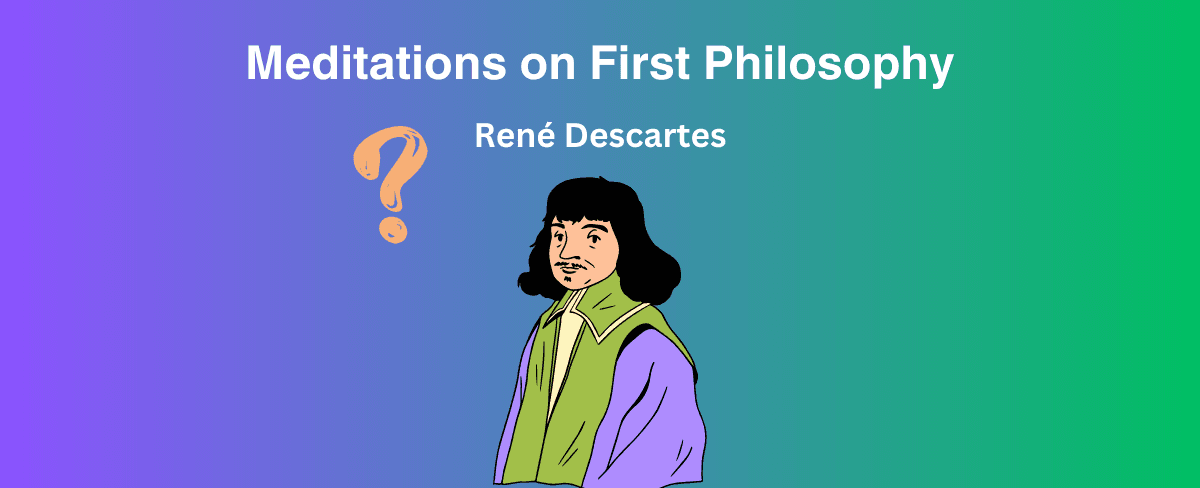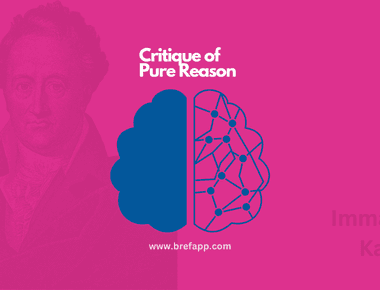
Meditations on First Philosophy: A Summary of Rene Descartes' Work

Rene Descartes was a 17th-century French philosopher who is widely considered to be one of the most influential thinkers in modern Western philosophy. His work laid the foundations for rationalism and the scientific method.
One of Descartes’ most famous works is Meditations on First Philosophy, a series of six meditations published in 1641. The purpose of this work was to provide a solid foundation for knowledge and to establish the existence of God.
First Meditation
In the first meditation of “Meditations on First Philosophy,” Descartes introduces his method of doubt. He suggests that everything we believe to be true may be based on false assumptions or illusions, and thus he sets out to systematically doubt everything in order to establish a solid foundation for knowledge.
Descartes argues that the senses can be deceived and that we cannot rely on them to provide us with accurate knowledge about the world. He suggests that illusions and dreams can make us believe things that are not actually true. For example, a person may see a stick in the water that appears to be bent, but this is an illusion caused by the way light is refracted as it passes through the water.
Furthermore, Descartes considers the possibility of an evil demon who has the power to manipulate our perceptions and deceive us about the nature of reality. This demon could make us believe that everything we experience is real when in fact it is not. This idea of an evil demon highlights the depth of Descartes’ skepticism and his commitment to finding a firm foundation for knowledge. By doubting everything, even the most basic and obvious things, Descartes hopes to find something that cannot be doubted and can be relied upon as a foundation for knowledge.
Second Meditation In the second meditation of “Meditations on First Philosophy,” Descartes presents his famous cogito argument: “I think, therefore I am.” He argues that the very act of thinking proves that one exists, even if everything else is doubted.
Descartes believes that if he is doubting, then there must be a thinking entity doing the doubting. Even if this entity is being deceived or manipulated by the evil demon, it still exists as a thinking thing. Descartes asserts that the existence of the thinking self is the only thing that cannot be doubted, and it serves as the foundation for knowledge.
Furthermore, in the second meditation, Descartes introduces the distinction between mind and body. He suggests that the mind is a non-physical substance that thinks, reasons, and understands, while the body is a physical substance that occupies space and is subject to mechanical laws. According to Descartes, the mind and the body are fundamentally different and separate entities.
This distinction between mind and body is important because it challenges the prevailing view at the time, which held that the mind and body were interconnected and interdependent. Descartes’ view laid the groundwork for a new way of thinking about the mind and body, which would eventually lead to the development of modern psychology and neuroscience.
Third meditation
In the third meditation of “Meditations on First Philosophy,” Descartes addresses the question of the existence of God. He argues that the idea of God, as a perfect and infinite being, is innate to the human mind and cannot be the product of sensory experience or human invention.
Descartes presents several arguments for the existence of God, including the cosmological argument and the ontological argument. The cosmological argument posits that there must be a first cause or prime mover that initiated the chain of causation in the universe, and this first cause is identified as God. The ontological argument, on the other hand, argues that the concept of God as a perfect being necessarily implies his existence. If God is defined as a being that possesses all perfections, then existence must be one of those perfections, and therefore God must exist.
Descartes’ proof of the existence of God is important because it serves as a foundation for his entire philosophical system. If God exists, then it is reasonable to believe that the world is orderly and follows certain laws, and that our perceptions and reasoning abilities can be trusted. This allows Descartes to move forward with his project of rebuilding knowledge on a solid foundation.
Furthermore, in the third meditation, Descartes introduces the idea of innate ideas, which are ideas that are present in the mind from birth and do not come from sensory experience. The idea of God is one such innate idea, and Descartes suggests that other concepts, such as mathematical truths and moral principles, are also innate to the human mind. This idea of innate ideas challenges the empiricist view that all knowledge comes from sensory experience, and it lays the groundwork for a rationalist approach to knowledge acquisition.
Fourth meditation
In the fourth meditation of “Meditations on First Philosophy,” Descartes explores the nature of truth and certainty. He argues that certain knowledge is possible, but it requires a methodical approach to reasoning and a clear understanding of the nature of ideas.
Descartes introduces the concept of clear and distinct perception, which refers to ideas that are clearly and distinctly understood and cannot be doubted. He argues that clear and distinct perception is the hallmark of certain knowledge, and that it provides a reliable basis for building a system of knowledge.
Descartes goes on to suggest that the source of error in knowledge comes from judgments that are made based on unclear or confused ideas. He emphasizes the importance of carefully examining ideas to ensure that they are clear and distinct before making any judgments based on them.
The concept of clear and distinct perception is important because it provides a basis for rationalism, which holds that certain knowledge can be obtained through reason alone. This approach contrasts with empiricism, which holds that knowledge comes primarily from sensory experience.
In addition to exploring the concept of clear and distinct perception, Descartes also considers the nature of truth and certainty. He argues that truth is dependent on clear and distinct perception, and that certainty is a matter of degree. Descartes suggests that absolute certainty can only be obtained through knowledge of God, but that clear and distinct perception provides a reliable basis for approaching certainty in other areas of knowledge.
Fifth meditation
In the fifth meditation of “Meditations on First Philosophy,” Descartes explores the nature of the material world and the distinction between primary and secondary qualities. He argues that the material world is composed of extended substances, which possess primary qualities such as size, shape, and motion, and secondary qualities such as color, taste, and smell.
Descartes suggests that primary qualities are objective and can be accurately perceived, while secondary qualities are subjective and depend on the perceiver. He emphasizes that secondary qualities do not belong to the objects themselves, but rather to the perceiving subject.
Furthermore, Descartes introduces the idea of substance and modes. He suggests that substances are independent entities that possess attributes, while modes are dependent on substances and do not have independent existence. In the context of the material world, Descartes argues that the mind is a substance, while the body is a mode of extension.
The distinction between substance and modes is important because it allows Descartes to explain how the mind and body can interact, despite being fundamentally different entities. He suggests that the mind and body interact through the pineal gland, which acts as a kind of mediator between the two.
The fifth meditation provides an important contribution to the philosophy of mind and the nature of the material world. Descartes’ approach to substance and modes would go on to influence the development of metaphysics and ontology in later philosophy.
Sixth meditation
In the sixth meditation of “Meditations on First Philosophy,” Descartes further explores the relationship between the mind and body. He argues that the mind and body are distinct entities, but they interact through the pineal gland.
Descartes also introduces the idea of voluntary and involuntary actions. He suggests that voluntary actions are those that are initiated by the mind, while involuntary actions are those that are caused by external forces. He further argues that the body operates according to mechanical principles, while the mind is free and can initiate voluntary actions.
Descartes’ approach to the mind-body problem is often referred to as Cartesian dualism. This view posits that the mind and body are separate entities that interact with one another. While Cartesian dualism has been the subject of much debate and criticism in philosophy, it has been influential in shaping the development of modern philosophy of mind.
The sixth meditation provides an important contribution to our understanding of the relationship between mind and body, and the nature of voluntary and involuntary actions. Descartes’ approach to the mind-body problem would go on to influence the development of philosophy, psychology, and neuroscience in later centuries.
Recap
“Meditations on First Philosophy” by René Descartes is a groundbreaking work in the history of philosophy. It presents a methodical approach to reasoning and a skeptical attitude towards knowledge that paved the way for modern philosophy.
Descartes’ method of doubt in the first meditation challenged traditional beliefs and assumptions, while his cogito argument in the second meditation established a foundation for knowledge based on self-awareness. His proof of the existence of God in the third meditation and the idea of clear and distinct perception in the fourth meditation provided a reliable basis for building a system of knowledge.
In the fifth meditation, Descartes explored the nature of the material world and introduced the concept of substance and modes. In the sixth meditation, he further developed his approach to the mind-body problem and introduced the idea of voluntary and involuntary actions.
Descartes’ work has had a profound impact on philosophy, science, and culture. His method of doubt has influenced scientific inquiry and critical thinking, while his approach to the mind-body problem has shaped the development of modern philosophy of mind.
Despite criticisms and challenges to his ideas over the centuries, Descartes’ legacy continues to inspire and influence philosophical inquiry and debate to this day.
Tags
Related Posts




Quick Links
Categories


